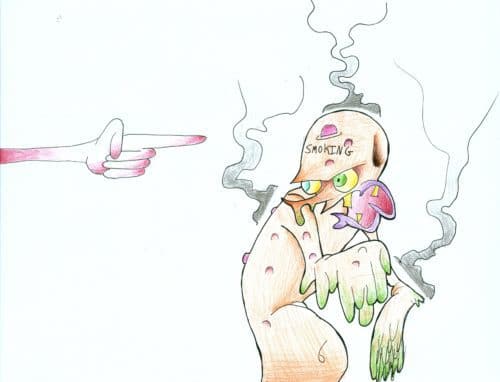On Monday, a Montclair State press release announced the university would be receiving a grant of over $19,000 in order to implement a program that would “accelerate and expand the eventual adoption and implementation of 100 percent smoke-and-tobacco-free campus policies.” The program, called Tobacco Free Red Hawks, hopes to educate the community of Montclair State and support those hoping to make a change in lifestyle.
Prior to the announcement, students were asked to complete an online survey regarding their thoughts and opinions of the proposed change, yet many smokers on campus are speaking out against these changes, and understandably so. These changes will result in a ban on all tobacco products, which concerns many who often smoke while on campus.
Some believe the university should not be able to regulate their tobacco use, but their tobacco use is affecting more than just them. Their tobacco use has a negative effect on non-smokers.
At Montclair State, secondhand smoke is a major concern. Just walking to class, non-smokers are raided with clouds of smoke when entering and exiting select buildings on campus. Even inside buildings, non-smokers are still subject to secondhand smoke, as some students disobey rules that prohibit smoking indoors.
The consequences of smoking affect far more than the individual smoking. Centers for Disease Control and Prevention warns that even adults who have never smoked are still at risk for heart disease, lung cancer and strokes from inhaling secondhand smoke. It is unethical for the university to continue to subject innocent students to these extremely serious risks.
Even though this ban seems like an attack on the tobacco-user population on campus, it is the only way to promote and ensure the health and safety of all students, staff and faculty. The university is trying to help all members of the Montclair State community, and hopefully this program will be able to do that.
Cliff Douglas, director of the American Cancer Society’s Center for Tobacco Control. said, “To be successful in creating a tobacco-free generation, it is important that we prevent and eliminate lethal and addictive tobacco among America’s college students.” By reducing and eventually eliminating tobacco products on campus, fewer students will have experiences with the substance.
On a more positive note, this will provide many tobacco users with the opportunity and tools to quit. The Tobacco Free Red Hawks program will likely be able to provide information, guidance and support to those individuals who are serious about change.
Progressing toward a tobacco-free campus is not just a win for non-smokers, but for smokers too. Becoming a tobacco-free campus will benefit everyone.



